#language learning methods
Explore tagged Tumblr posts
Text
The Nature Method
Information about the old Nature Method institute's textbooks. Note: Lingua Latina is still being published and can be bought from the official publisher. The other nature method textbooks are either out of print (and can be found online if you look), or are being printed by a few companies making them easier to access again (I found a company printing the All Spanish Method since I wanted a print copy badly). This rather long page also mentions some newer books which have come out since for Russian in a nature method like style, which is the first I've heard about: "In addition, we have Marianna Avery’s Сорока (Soroka) children’s books, as well as Stanislav Chernyshov’s Поехали! (Poekhali!) books. There is a new course entitled Дорога в Россию (The Way to Russia) by V.E. Antonova, M.M. Nakhabina, and M.V. Safronova, too. There is also Ignaty Dyakov’s series of books, Рассказ Сенсация (The Story of Sensation), Рассказ Провокация (The Story of Provocation), and Рассказ Канонизация (The Story of Canonisation), to which learners sing praises. Still, though, darn it, I want to find Uncle Oleg’s course!"
A collection of links to several of the nature method and direct method style textbooks. Note: several of these can also be found on archive.org and annas-archive.org. These are not all by the nature method institute. The 'direct method' books are a little bit different, they still use only the target language, but they're often designed with the intention that a teacher will help students understand the meaning of unknown words and the lessons are more dialogue based. Poco a Poco textbook is more 'direct method' styled, compared to say Lingua Latina which is more 'nature method.' Nature method textbooks tend to have more context of what is happening on the page (This is Maria, she is Mary's mom, Mary is the little sister to Sophia, Sophia and Mary are Maria's daughters), more of a connected narrative through each chapter (versus direct method where you see more 'this is a chair' 'this is an elephant' 'this is a rose' 'is this a rose?')
#rant#language learning methods#study method#nature method#the nature method#direct method#the direct method#comprehensible input#ci method#ci#article#reference#resources#language learning resources#books
5 notes
·
View notes
Text
Explore Effective Language Teaching Approaches Used Worldwide
Language is the most optimal mode of communication. It is the unique factor that distinguishes human beings from animals. Language teaching is one of those areas of human enterprise that will never go out of demand. Language teaching is conducted in a variety of methods. Each method has its own language learning philosophy. 1. Communicative language Teaching (CLT) In Communicative Language…
#best practices#global language teaching#Innovative Strategies#instructional techniques#language education#language learning methods#language teaching approaches#teaching methodologies
0 notes
Text
these methods are what are helping me the most to learn spanish:
1. Label Your Household Items: Place labels with Spanish names on objects around your home. This constant exposure helps reinforce vocabulary in a practical context.
2. Create a “Spanish Only” Zone: Designate a specific area or time each day where you only use Spanish. This could be a room or a period during which you read, watch TV, or speak only in Spanish.
3. Use a Spaced Repetition System (SRS) for Vocabulary: Instead of traditional flashcards, use an SRS app to review words and phrases at increasing intervals. This method helps improve long-term retention of vocabulary.
4. Write a Diary in Spanish: Keep a daily journal in Spanish. This practice helps you think in the language and improve writing skills while reflecting on your day.
5. Sing Along with Spanish Music: Choose songs in Spanish and sing along, paying attention to the lyrics. This helps with pronunciation, rhythm, and understanding colloquial expressions.
6. Learn Through Role-Playing: Act out scenarios in Spanish, such as ordering food in a restaurant or asking for directions. This method helps you practice practical language use in a fun and interactive way.
Important: Methods can change depending on what works for you, so try everything you can. Methods can also turn out to be less effective as you gain more knowledge.
obs: Spanish is my priority right now because I’m no longer learning it as a hobby but as a necessity. You are free to correct me.
#spnotesbyvi#study notes#langblr#studyblr#study motivation#study method#learning spanish#spanish language#spanish studyblr#study blog#learn spanish#espanol#espanhol#español#🇲🇽#🇪🇸#correct me if i'm wrong
150 notes
·
View notes
Text
Rory pointed a grouse so good this morning, it was so awesome to see the conviction in her point and her steadiness until I moved closer to her and sent her to flush it !!!!!!!
#dogblr#about aurora#bird dog training#im sooooo happy with how its come together for her#i dont have space or birds to train it with a check cord and im not a fan of the flank collar method#so it was really just getting her on wild birds and waiting for it to click#but its clicked (on ruffed grouse at least)!!!!!!#miles was here and i think this was his first time seeing her point steady on proper birds it was awesome#i sent her to flush it because shes still a baby and learning and getting to flush the bird is the best reward i could give her#(besides you know shooting it for her to retrieve)#as she grows up and learns more ill stop letting her flush them#but for now she's allowed and encouraged as long as she waits for me to tell her#peak nesting season starts in a couple weeks so we'll be off wild birds as much as possible very soon#very happy to see it click consistently for her before we have to pause for the season#also i hashtag hacked her body language#tail up and quivering is productive point#tail relaxed is old scent or songbirds
29 notes
·
View notes
Text
🎏Immersion, its quirks, and tips for language learning this way!


its the 5th of May, so happy children's day! 🎏 I got a question in one of my posts asking for some advice on immersion learning! i thought it would be a good opportunity to talk about immersion in general, my current study(?) routine and perhaps give some useful advice! As the name suggests, Immersion language learning is done primarily by consuming media in your target language. Immersion can seem super intimidating to us learners, mostly cause we can't understand most of the stuff available to us. But! its not impossible to start out using immersion right out of the gate. i think people tend to get scared or go "I'll immerse when i get better at my TL!" But the truth of the matter is, your not going to get used to, or better at your target language unless you consume actual content. (in my opinion.)
Honestly, a lot of immersion learning is being able to tolerate that i probably wont understand everything right away. I will someday, but for now i have to be comfortable with not understanding a lot. which is okay! So, what is my current study routine?
right now, my routine consists of:
doing vocabulary cards on Anki from a premade anki deck.
playing about an hour of Animal crossing everyday
watching 1 - 3 episodes of an anime
watching Youtube videos
weekly (ish) grammar done by reading Imabi, and watching Cure Dolly videos on Youtube.
The bread and butter of my routine is learning vocab, and occasional grammar studies. I'm using the core2k/6k deck. which as the name implies, is an optimized vocab deck that contains the most common 6k JP vocabulary. i currently take 5 new vocab cards a day, and try to get my reviews in everyday. my anki deck has contributed a lot to me being able to immerse so early in my language journey. learning and then reviewing new words everyday lets me recognize words in my immersion. As time has gone on, i can recognize more and more words, and even some words I haven't encountered yet in my deck. Immersion, while still uncomfortable, (especially with complex media) is the other side of the coin. i try to spend double the time i spend on anki, immersing. Mostly because i enjoy what I'm immersing in, but also because i get more out of it the more time i spend immersing.
"that's all well and good Lucky, but what advice would you give to someone who wants to learn this way?"
Well! first of all, and this is very important:
Be comfortable with ambiguity. you may not be able to understand some, or maybe most of the thing you are immersing in. that's okay! Your brain is already looking for patterns to see in your TL, and is growing more accustomed to it. I got a lot of headaches in the beginning, i still do actually. but i know that's my brain working hard! (take a break if you get a headache!!)
Second, and probably just as important:
Follow your interests. make immersion fun! whats the point of immersing if its torturous?! I'm a lot more likely to continue immersing in something if i actually enjoy it. there are a lot of easier anime to immerse in, but if I'm not having fun, I'm not going to learn anything. you should do the same! even if its too difficult to understand. I'm currently watching someone on YouTube play a dating sim, and even though its waaaay above my skill level, I'm really enjoying myself watching it! I've even recognized some words i know. whole sentences, even.
Third:
Be Consistent! This is probably advice you've already heard, but it bears repeating! even if you do something small like listening to a song in your TL, that's immersion babyy :) consistency is key, above all.
Lastly: Track your Immersion. a problem with immersion is it can feel like you are going nowhere. tracking how much time you spend doing an activity, (watching videos, reading, etc) is a great way to make immersion more tangible. lots of people reccomend toggl, but i personally use polylogger. its built with language learners in mind, and is stupidly easy to use. i also keep personal logs in an online diary, as well as here on my blog to measure my progress. it helps!
alright, i think thats everything i have to say for now! if you've made it to the end of this long post, hello! and thank you <3 hope you've had a good day so far! I will leave you with some links to more reading on the subject under the cut, they go into more detail than i have here.
take care for now! またね!
this article by Refold about tolerating ambiguity:
The Moe ways guide to immersion:
Making the leap to Immersion, Video by Cure Dolly:
youtube
#lukrio chats#language learning#japanese langblr#langblr#studyblr#japanese resources#japanese language#learning japanese#japanese studyblr#language blog#language advice#learning tips#language resources#linguistics#language#please go ahead and msg me if youd like to talk about it more! i still have a fair amount of resources stashed away#long post#sorry this turned into a mini essay#i think i tend to over share a bit#sorry if this is a slog lmao#i truly believe in this method#BUT i will say immersion can blow a lot at the beginning#it can be frustrating and exhausting#and it can feel like you are going nowhere.#but i think if i can do it#adhd squirrel brain and all#you can too <3
114 notes
·
View notes
Text
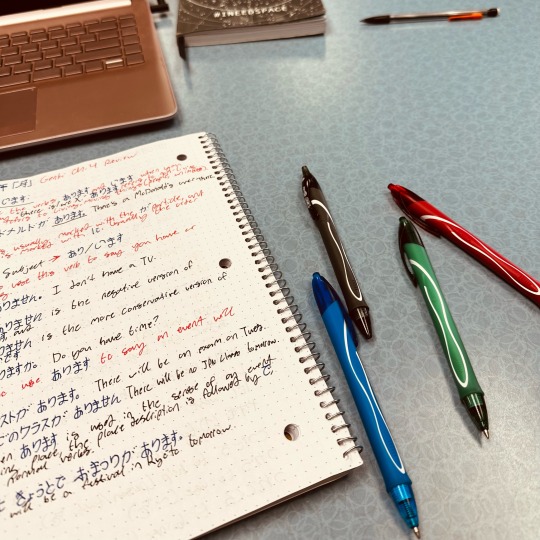
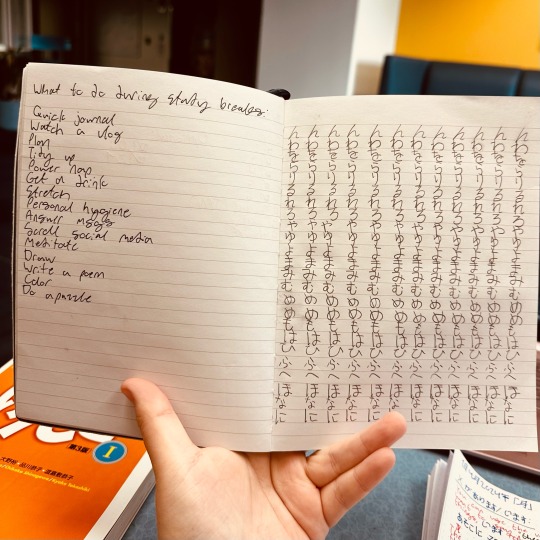

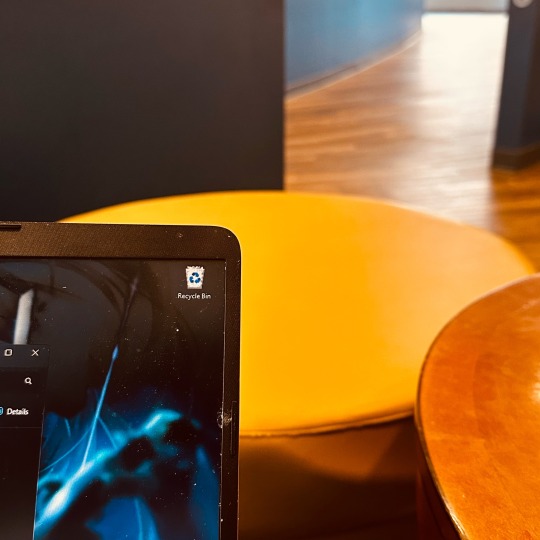
1日4月2024年 「月」
I’ve already gotten a lot done and it’s not even noon. Yesterday I didn’t post because I barely left my dorm, but I got a lot done yesterday too.
What I’ve Done:
Anki
WaniKani
Writing drills
Watched one episode of Given (no spoilers, I’m up to episode 9 so I’m almost done)
What I Have Left To Do:
Genki Chpt 4 review
I’m glad I took a rest day on Saturday, but also I realized Friday night that I was kinda gonna be forced to because I went to my girlfriend’s brother’s house to see my niece and nephew.
I’m taking a break for a few hours and then I’m gonna get back to it.
#japanese langblr#japanese studyblr#langblr#studyblr#japanese studyspo#japanese study#language study#language learning#japanese language#study goals#study methods#study blog#studyspo#study motivation#studying#study aesthetic#op#i’ll never get over how many tags that is#also thank you for all the boops#i’m booping back through my main
98 notes
·
View notes
Text
Kind of whack that the main way of teaching languages -- school, tests, apps -- often focus on details rather than the gist of meanings.
Like, does it really matter if i mix up masculine and feminine endings in spanish every time? If i conjugate verbs badly? Most of the people i know who make those sorts of mistakes in english ('he is go now' instead of 'he is going' etc) can communicate fine in the workplace and casual conversation, like? it's literally fine, but both academia and teach-yourself resources would prolly fail them
Meanwhile if someone could say english in perfect pronunciation, flawless grammar, and literally did not know most of the words in the english language, we'd struggle to talk at all
#language#langblr#im glad were seeing other learning methods pop up#btw don't feel the need to inform me that grammar literally encodes meaning inside it. i know that. it's just that you can destroy grammar a#and still have sentences with meaning
74 notes
·
View notes
Text
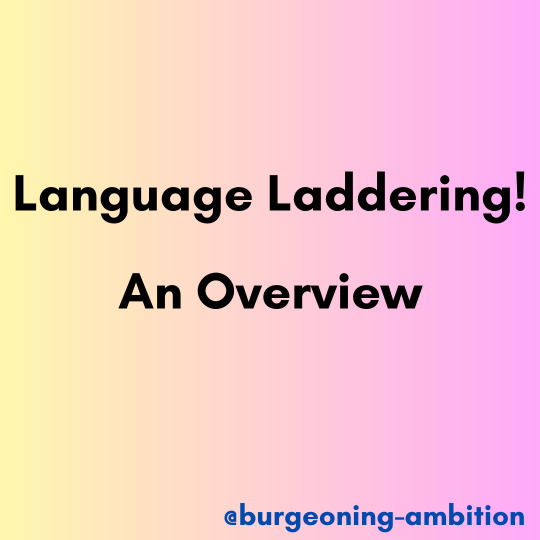

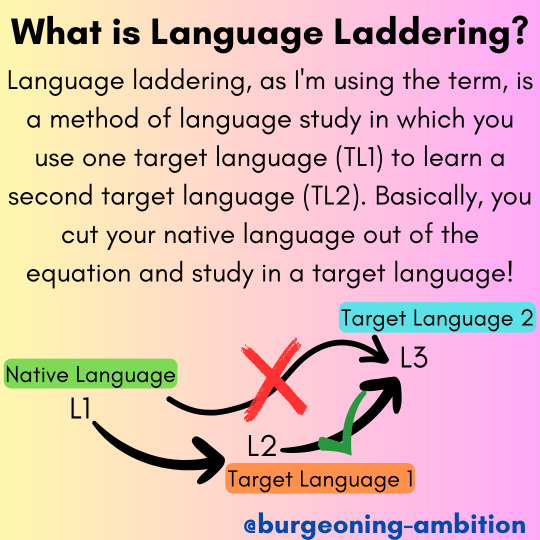


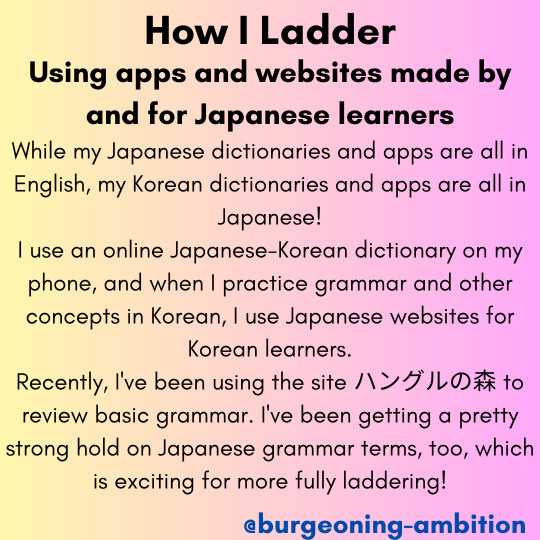

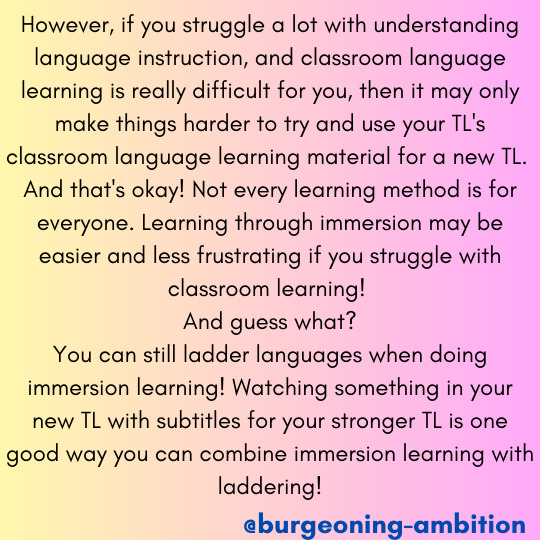

Finally a first language laddering post! In the near future I hope to start posting updates to my personal studying, maybe accompanied by study materials for others to use if I have the time! But first, I wanted to post an introduction.
Transcript of the images below the cut!
Language Laddering!
An Overview
I recently made a post asking about interest in me posting my personal Japanese -> Korean language laddering study journey and resources. And a lot of people seemed interested! Let's start off with an introduction to language laddering itself, since people may not have heard of it, or may not recognize this name for it! For my own personal stuff, I hope to post updates to my studies along with some resources as regularly as I can manage!
What is Language Laddering?
Language laddering, as I'm using the term, is a method of language study in which you use one target language (TL1) to learn a second target language (TL2). Basically, you cut your native language out of the equation and study in a target language!
How I Ladder
There are several methods you can use that I'd say count as language laddering, but I'm only going to go super in-depth into the methods I personally use!
If you study this way and have a specific method you love that I didn't mention, please mention it in a comment or reblog! I'd love to hear more methods.
Reading Japanese textbooks for Korean
Getting access to resources in Japanese is definitely harder because of international shipping, but I'm able to find store listings that offer sample pages! I've been using these until I can get the money to actually buy them.
In the meantime as I wait to get fully Japanese texts, I use the speaking pen from Learn Korean With BTS, haha- the speaking pen reads the book in four languages, and Japanese is one of them! So I just listen to it like an audiobook instead of reading the English!
Using apps and websites made by and for Japanese learners
While my Japanese dictionaries and apps are all in English, my Korean dictionaries and apps are all in Japanese!
I use an online Japanese-Korean dictionary on my phone, and when I practice grammar and other concepts in Korean, I use Japanese websites for Korean learners.
Recently, I've been using the site ハングルの森 to review basic grammar. I've been getting a pretty strong hold on Japanese grammar terms, too, which is exciting for more fully laddering!
Laddering languages in the way I choose to can be a very fun way to learn a new language and study one you've already been working on, but it doesn't work for everyone!
People who enjoy learning grammar and reading about how language works may enjoy it because they can learn grammar the way it's taught in their target language rather than how it's taught in their native language! This can be exciting, it's interesting to see how different languages teach concepts and learning grammar terms in a TL can open grammar-related doors! If you're a linguistics nerd like me, grammar-related doors are super exciting.
However, if you struggle a lot with understanding language instruction, and classroom language learning is really difficult for you, then it may only make things harder to try and use your TL's classroom language learning material for a new TL.
And that's okay! Not every learning method is for everyone. Learning through immersion may be easier and less frustrating if you struggle with classroom learning!
And guess what?
You can still ladder languages when doing immersion learning! Watching something in your new TL with subtitles for your stronger TL is one good way you can combine immersion learning with laddering!
I hope to post more about language laddering, although it will probably be pretty catered to my own personal study! People can feel free to send asks about anything specific they'd like to know! (Although I certainly am not an expert, so I can't answer everything)
Also, I know this post was SUPER text heavy, so thank you for making it to the end! I hope it wasn't too droning to read ^-^ Good luck with language laddering if you decide to try it!
#original post#language laddering#language learning#japanese#korean#langblr#study methods#studyblr#studying#japanese language#korean language
189 notes
·
View notes
Text
specifically the post i’m annoyed by is by a big blog that will remain unnamed (general big blog, not language sphere big blog…i think. unless my judgement of this person’s online activity is entirely off) and insists that if you “just turn on the [language] subs rather than english subs” you’ll…somehow magically begin to understand (presumably at least intermediate conversational) dialogue in shows? which, i think comprehensible input can be a great tool but…that’s not CI. you’re just advising people to do something that will have little to no payoff unless they’re already familiar with the language’s basics (at least!)(the post was specifically aimed at beginning learners with no/little familiarity, though!) and which will probably leave them frustrated and demoralised…i don’t mean to gatekeep but i think sometimes maybe people shouldn’t confidently claim xyz method is the One True Secret Solution. especially if they have, quite literally, no sources to back them up besides (to quote the internet) “source: trust me bro”.
#am i maybe getting too annoyed by some rando’s post on tumblr dot edu? maybe#however in my defence i am deeply deeply sleep deprived#i just…as someone who tries to generally speak from personal experience OR with citations (or preferably both!)#it really ticks me off when people act like they know the One True Way to things#especially when said people have no apparent qualifications and deride the people who question them#anyway. if you know this post feel free to commiserate. if you agree with this post…not sure i can do anything#i also just really get annoyed when people claim that the longstanding educational#methods for language learning are 100% without fail Wrong and actually *their*#solution is perfect and flawless (sources: zero)#like i’m not saying that traditional learning methods are perfect or above reproach but…they exist for a reason?#and that reason is usually because it works more often than not (and also it’s not as resistant to new research/discoveries/etc#as some people like to think…academic fields aren’t perfect but they aren’t the ivory towers of stodgy white men some people online think)#anyway. that was a tangent. sorry#delete later#indigo ink
15 notes
·
View notes
Text
me: we should get into hydrology or ecology or something geography related. we are good at geography and love stupid bullshit like that. its a viable career path with lots of options and historically speaking people do tend to be happier when they can afford to eat
also: okay but have you considered. going all-in on creative writing with a focus on programming and music design so that you could spend all your time creating video games in a basement somewhere
me: no i think i would like to have a stable income i think
also me: forsake everything to get into that interactive fiction course right fucking now
#ramblings#at that embarrassing stage where when ppl ask me what program im in and just shrug and say Who Knows#the thing is. if i went the arts route i would probably still jave to take SOME sciencish courses#and if i went the geography route i would still probably have to take some humanities courses#so like neither route would necessarily lock me out of learning the other stuff#but Which One Do I Want A Shiny Certificate In#lets not think about the possibility of me going all in on modern languages theres already enough going on here#the thing is that i dont think i have the right? temperament for the geog route?#like i think geography majors and adjacent guys are usually more interested in??? i dunno important shit?#personally i like learning about geography and history and anthropology bc thats World Building for Real Life#i only ever employ the scientific method for bullshit#not to be a sub but i really wish something or someone else would forcibly narrow down my options for me
17 notes
·
View notes
Text
@earlgrey--tea you asked who learned French just by watching TV shows and I'm thrilled you asked.
Here is the paper Peter Llewellyn Foley published: Picking up a second language from television: an autoethnographic L2 simulation of L1 French learning. Looking over the paper again now, he did 1500 hours of audio-visual French material for native speakers. He read toward the end of that period for some hundreds of hours, and he talked to people in French similarly toward the end of that period for some hundreds of hours. I read the whole thing, and I recommend anyone else who's curious reads the whole thing. Because my takeaways may not be the same as another person's. The paper includes what he did, how he studied, how he tracked his study, what study materials worked best (he found children's cartoons with a lot of visuals of what is being talked about were the easiest to learn from in the first few hundred hours - and adult television where they talk about things not directly visually shown as some of the hardest stuff that he used once he had more understanding of the language).
His paper shows at least 1 person could learn French by watching shows (with children's cartoons being best at the beginning stage until you learn more words), and trying to figure out what each thing means as you hear it. He did a lot of puzzling out the sounds he heard, using context and guessing what was being talked about (for curiosity's sake he did the opposite of what ALG Automatic Language Growth articles tend to suggest people do). He did not do any reading later sometime after 1000 hours, and it's fascinating how different he imagined French spelling was based on his guesses from the sound, compared to how it is actually spelled. He did use some graded readers for learners once he was reading.
He did not look any word translations up when watching all those shows. He personally makes the guess that if he HAD looked up words, if he HAD used French subtitles, and if he had focused entirely on children's shows at first, his progress might have taken less time. But his experiment did not do that, so it's only a guess, and actual success of people who've looked up words should be referenced instead for how successful or not it is (people like r/Refold learners look up words while watching shows), and he did not use any video materials made for language learners but my personal thinking is that Comprehensible Input type lessons at the beginning stage may have worked even better than children's cartoons.
To me, his level of understanding and ability to do things lines up fairly well with Dreaming Spanish's roadmap estimated hours to do X things. That makes sense to me as Peter basically studied with stuff made for native speakers, which eventually became more comprehensible. And Dreaming Spanish is designed to be fully comprehensible to a learner, until they can comprehend stuff for native speakers. I imagine Peter had a harder time initially, but as an English speaker learning French, with all the cognates, maybe he didn't have to learn as much to cross the threshold into comprehending children's shows as someone learning a language with no cognates.
I wrote my in depth thoughts about his paper here but it's mostly just rambling.
#rant#earlgrey--tea#replies#i think of Peter's paper whenever i wonder how many hours i need to study#cause i figure okay i'll make SOME progress in 1500-2000 hours#possibly less#but if i havent studied at least that long. no matter what method im studying. i need to temper my expectations to be below B2#i also think he's a wonderful case of if you can learn from purely material for native speakers and doing NO word lookups/no study in your#native language#there are certainly ways of studying in ONLY the target language which hold your hand MORE than what Peter did#(comprehensible input lessons. the nature method textbooks.)#and there are things a person can do to make what Peter did EASIER (like studying 2000 common words in flashcards/anki then looking up#new target language words in reading and shows in a target language dictionary)#(or using target language subtitles from the start like Peter theorizes may have helped more - although there's argument that could've#worsened his listening skills)
22 notes
·
View notes
Text
the problem with being autistic is if you only talk to The People You Are Used To Talking To every day you start to feel like you’re so normal and good at talking
but then whenever you decide to venture beyond that and talk to people outside of that group of people you feel like a little fuckin alien freak
#i wanna ask my gf to let me into the kpop server she’s a mod for bc she said they have a channel in there to practice korean#and i wanna practice but i am scared to come off like a little freak 😭#i had to leave the last korean learning server i was in bc people were in a self sucking contest about their methods of learning a language#and they were shitting on someone who was just trying to learn bc they weren’t learning The Chad Way or whatever#and i defended them bc i thought it was BS and then they started to come at me and be annoying and i just didn’t feel like dealing with#people that think there’s only one way to do something and think they’re so smart#most obnoxious type of person#HUMBLE YOURSELVES
7 notes
·
View notes
Text

The ultimate family tree guide (or how to call every single member of your family) by everpresent!
#study blog#studyblr#langblr#study motivation#study notes#langblog#language#study time#english langblr#practicing english#learn english#english#languages#study advice#study inspiration#study method#study tips#studies#engnotesbyvi
43 notes
·
View notes
Text
me knowing logically that immersion will provide more long term gains for language learning vs 5 new vocab flashcards and some grammar exercises go brrrrrrrrr
#i'm trying to create a structured plan w timelines for learning biblical languages (gonna start with greek and go from there)#idk i've just always learned languages in a very traditional way and i always default to it instead of trusting the immersion process#i just downloaded 2 apps on my phone so i could compare their biblical/koine greek courses before catching myself cus i said i wouldn't#ah yes apps only an infamously amazing way to learn languages to a high level#ig i have resistance to adapting popular immersion methods to dead languages and the thought of doing all that adjusting is making me want#to reach for The Apps like an ipad baby#“all listening to low level videos and no reading until x level” my brother in christ this is the new testament#i forgor that other immersion methods that are not dreaming spanish exist so i'm gonna research refold to see how that translates to dead#languages and will report back ig#the siren call of the language learning apps though!!#right back to research#edit: also these immersion methods focus on speaking as the end goal which i obvs won't be doing.........so yeah idk#ellis exclaims#langblr
10 notes
·
View notes
Note
Please elaborate on the "nene teaches tsukasa to sing in a way that doesn’t make me angry" because as much as I like Nene the way she teacher people to sing does indeed make me a little angry (that's on sega not on her probably-)
OHH I meant that I hate tsukasa’s singing voice and nene needs to help him before I start a petition to have colopale release daisuke hirose from the shackles of singing with a character voice. I’m not a singer & most of my knowledge of music/singing on the technical level comes from osmosis of knowledge from my sister who studied comp/vocal performance for years and at a higher level. And that essentially amounts to something something diaphragm sing from the stomach (? Or is it chest) round your vowels natural talent can only get you so far if you don’t refine it the voice is an instrument. Dont drink dairy. Etc.
I can’t really critique nene’s teaching methods (also don’t remember them well enough. Iirc rui does say nene’s teaching helped emu improve though) although I’m sure anything before canary can be explained by her not knowing what she was doing and being self taught. And she probably still doesn’t know what she’s doing which I expect nene5 to go into with the opera group they’re visiting.
#if u have issues w her teaching method I’d like to hear them bc I’m not knowledgeable enough to recognize them#me listening to my twin sister talk abt learning to sing songs in German/italian (languages she doesn’t speak) and going to the college#practice rooms 2+ times a week to practice and taking lessons while also juggling her second major (psych)#while I’m on the couch fighting with illustrator (I have a pretty picture due at midnight) was a very funny experience#asks
16 notes
·
View notes
Text
the way language is taught in American schools is so bad like this is closer to math than language. you're giving me concepts one at a time to plug into premade scenarios or sentences or whatever. thats not how you learn a language. im great at spanish when it's taught this way but i wouldn't say I actually know it because i don't actually understand it as a language i only understand it as a set of concepts.
#grymms spectacular fucking posts#it's so stupid how does anyone think this is actually teaching anything#like yeah some people can go on to understand and soeak languages thru this method but it's largely inefficient and unintuitive#focusing on the gammatical stucture of a language is important but studying it to this degree feels stupid cus thats something that you can#get a feel for overtime and also many times if you say something weird grammatically it's not actually that big a deal#also the words we learn are so stupid like i do not need to know the spanish word for fishing. that is not a word that will get me anywhere#there are hundreds of words that would be more useful than that
9 notes
·
View notes